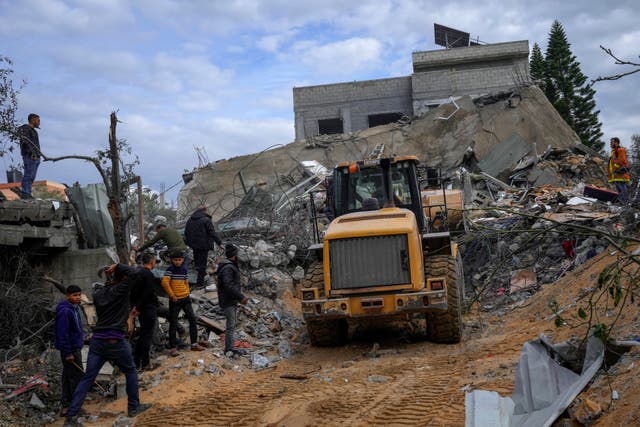Commons Speaker under pressure after Gaza vote chaos
There are questions over Sir Lindsay Hoyle’s future after he sparked fury by breaking convention by selecting a Labour amendment for debate.

The Speaker of the House of Commons is under pressure over his handling of a debate on Gaza, which resulted in MPs passing Labour’s amendment calling for an “immediate humanitarian ceasefire” amid scenes of chaos.
The motion was approved but only after Sir Lindsay Hoyle upended parliamentary convention by selecting Labour’s bid to amend an SNP motion on the Israel-Hamas war.
His decision sparked fury from the Conservative and SNP benches, who accused him of helping Sir Keir Starmer avoid another damaging revolt over the Middle East issue.
Sir Lindsay issued an apology after a day of acrimony but continues to face calls to resign.
More than 30 MPs have signed a parliamentary motion tabled by a Tory MP declaring no confidence in the Speaker.
Commons Leader Penny Mordaunt launched a bitter attack on Sir Lindsay, claiming he had “hijacked” the debate and “undermined the confidence” of the House in its long-standing rules.
They could come face to face again on Thursday when she delivers a business statement in the Commons.
The row erupted when Sir Lindsay decided the Commons would first vote on Labour’s amendment before moving on to further votes on the SNP’s original motion and then a Government proposal seeking an “immediate humanitarian pause”.
He disregarded warnings from the House of Commons Clerk over the unprecedented nature of the move, which provoked uproar in the chamber.
Labour’s amendment ended up passing unopposed without a formal vote after the Government pulled its participation.
It marked the first time the Commons formally backed an immediate ceasefire in Gaza, though the Government does not have to adopt the position as the vote is not binding.
The SNP were ultimately unable to vote on their proposition calling for “an immediate ceasefire”, which was meant to be the focus of their Opposition Day.
SNP MPs and some Conservatives walked out of the debate in protest at the Speaker’s handling of the matter in extraordinary scenes.
After calls for him to return to the chamber to explain his move, Sir Lindsay apologised to MPs and vowed to hold talks with senior party figures.
Amid shouts of “resign”, he said: “I thought I was doing the right thing and the best thing, and I regret it, and I apologise for how it’s ended up.”

He said he took the decision to allow all sides to “express their views” and that he was “very, very concerned about the security” of MPs who have received personal threats over their stance on the Gaza conflict.
But SNP Westminster leader Stephen Flynn said he would take significant convincing that the Speaker’s position was “not now intolerable” and claimed his party had been treated with “complete and utter contempt”.
He also called for an investigation as he appeared to suggest Sir Keir and Labour’s chief whip had exerted pressure on Sir Lindsay, a former Labour MP, ahead of his decision to pick the party’s amendment for debate.
Had the Speaker not chosen it, Labour MPs in favour of a ceasefire could have been pushed to back the SNP motion, in a repeat of a major rebellion against the Labour leadership in November.
However, Labour frontbencher John Healey told BBC Newsnight it was “totally untrue that he (the Speaker) was put under pressure”.





